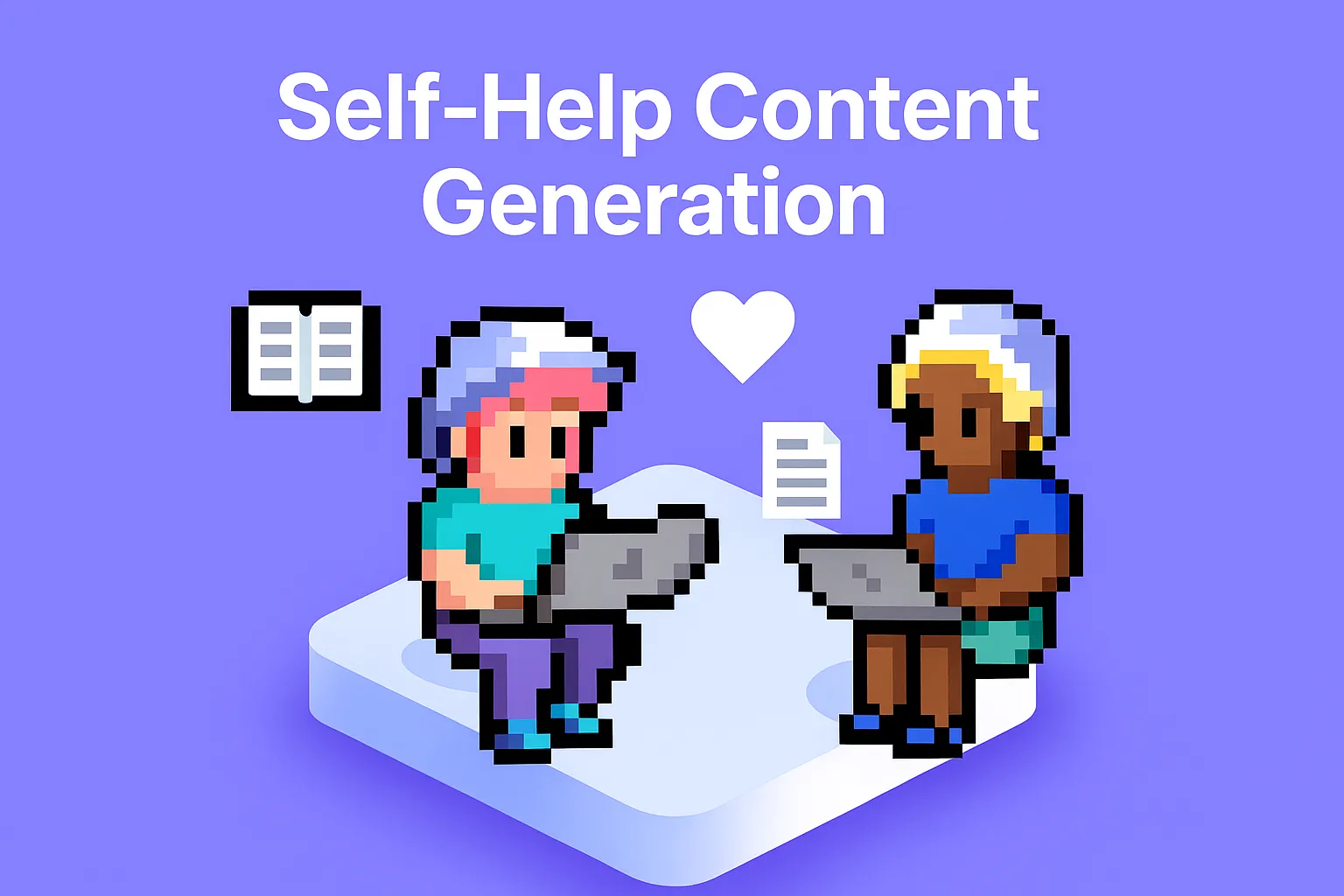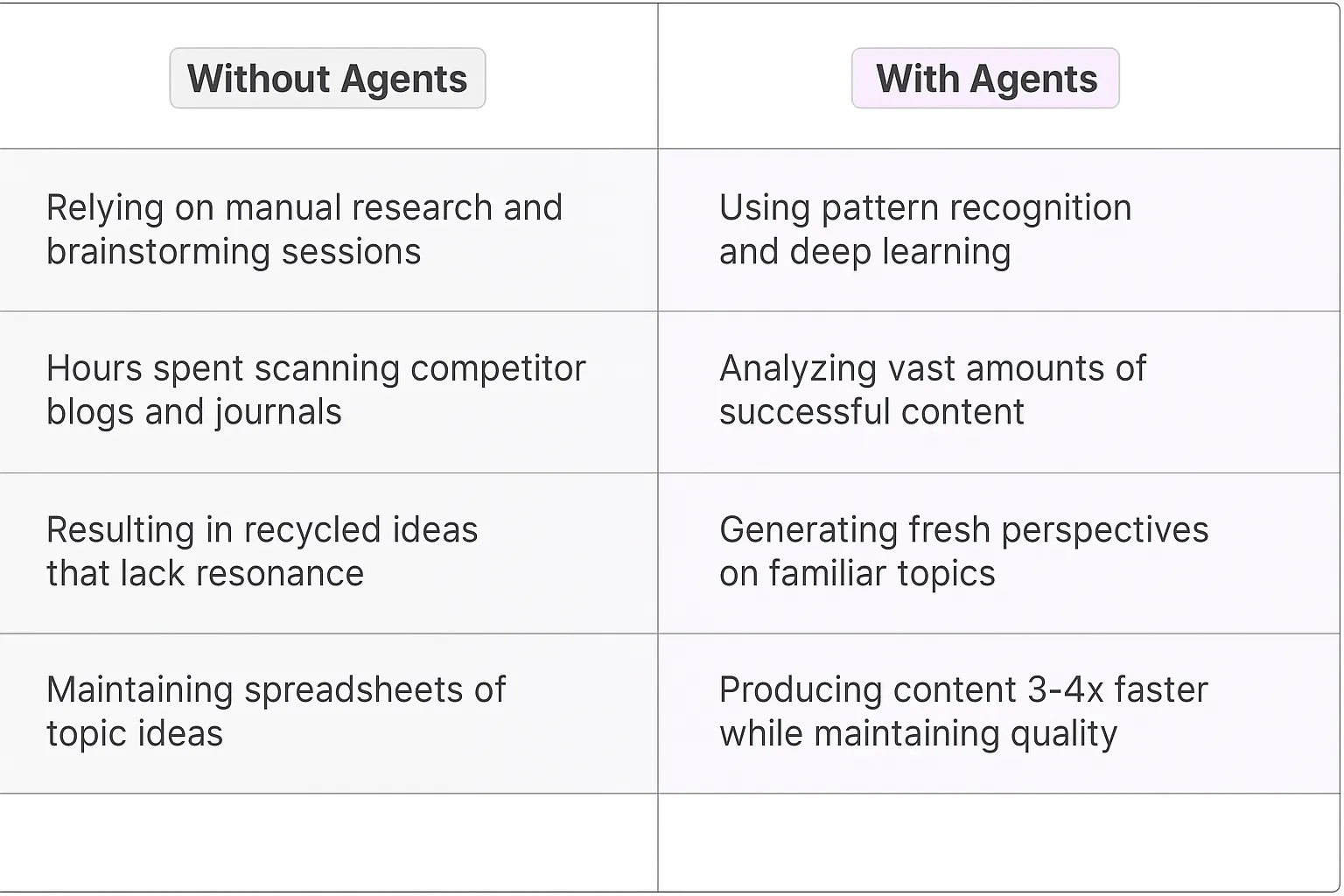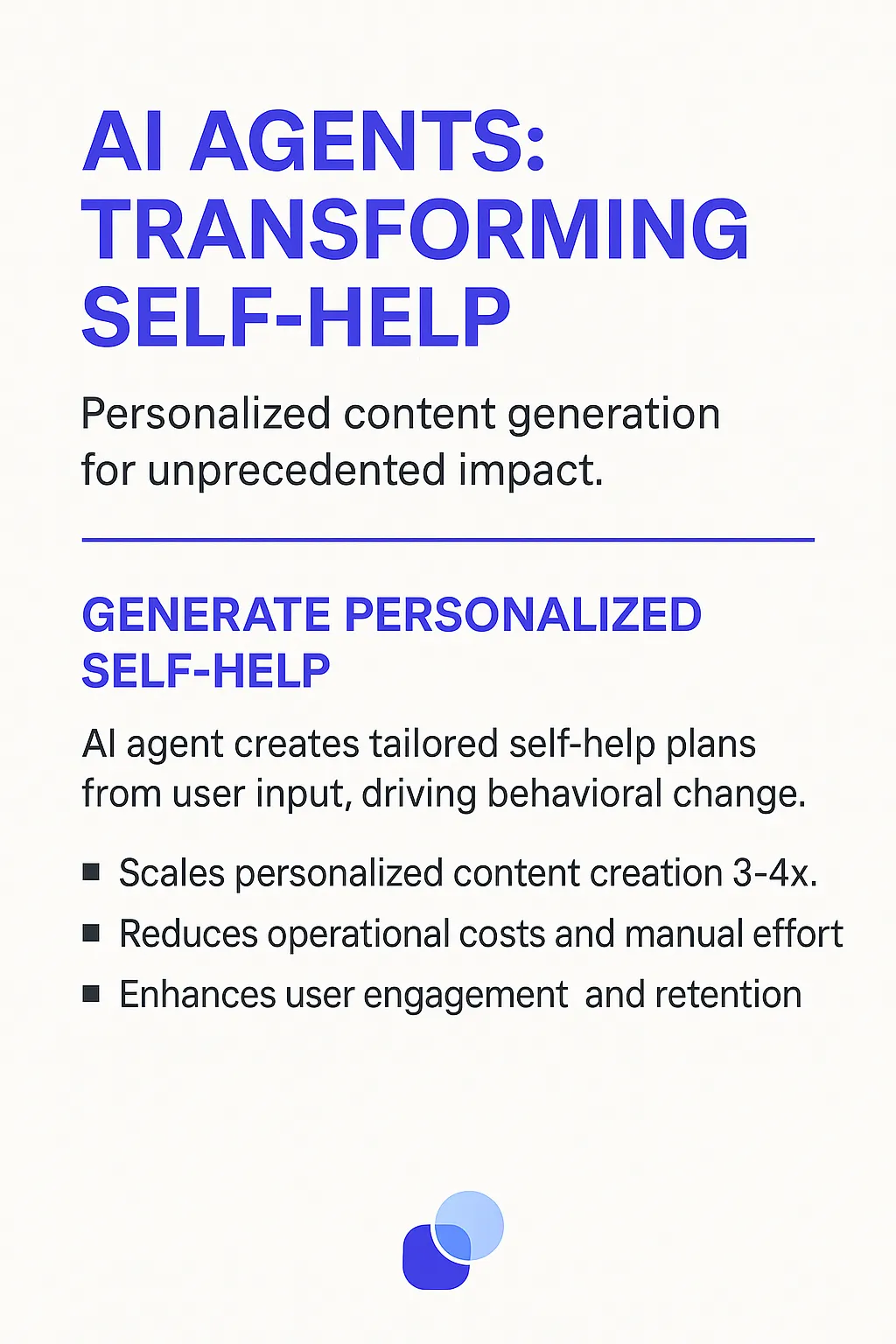Self-help Content Generator AI Agents
Understanding AI-Powered Self-Help Content Systems
What is Self-help Content Generator?
A Self-help Content Generator is an AI-powered system that creates personalized development materials by analyzing patterns in successful self-help content, psychological research, and user engagement data. Unlike basic text generators, these specialized tools understand the nuances of personal growth, behavioral change, and emotional well-being to produce content that drives real transformation.
Key Features of Self-help Content Generator
- Pattern recognition across vast libraries of personal development content
- Personalization engines that adapt content to individual needs and progress
- Multi-format content creation capabilities (text, exercises, prompts)
- Cultural sensitivity and emotional intelligence filters
- Integration with tracking systems to measure content effectiveness
- Quality control mechanisms to ensure psychological safety

Benefits of AI Agents for Self-help Content Generation
What would have been used before AI Agents?
Content creators traditionally relied on a mix of manual research, brainstorming sessions, and endless Google searches to generate self-help content. They'd spend hours scanning through competitor blogs, psychology journals, and self-help books to piece together insights. The process was not only time-consuming but often resulted in recycled ideas that didn't truly resonate with readers.
Teams would maintain extensive spreadsheets of topic ideas, hire freelance writers, or depend on in-house content teams who might lack specific expertise in self-help topics. This created bottlenecks in content creation and often led to inconsistent quality.
What are the benefits of AI Agents?
AI Agents fundamentally transform the content creation process by bringing pattern recognition and deep learning to self-help content generation. These digital teammates analyze vast amounts of successful self-help content, understanding what resonates with readers and why.
The real power lies in their ability to generate fresh perspectives on well-worn topics. Instead of rehashing the same "wake up at 5 AM" advice, AI Agents can synthesize insights from psychology research, behavioral economics, and real-world case studies to create nuanced, actionable content.
Content teams using AI Agents report 3-4x faster content production cycles. But speed isn't the main benefit - it's the ability to maintain consistent quality while scaling output. AI Agents can adapt their writing style to match your brand voice while ensuring each piece contains the depth and authenticity readers expect from self-help content.
What's particularly interesting is how AI Agents help avoid common self-help content pitfalls. They can flag potential oversimplifications, check for cultural sensitivity, and ensure advice is grounded in credible psychological principles rather than pop psychology.
The network effects are fascinating too - as these AI Agents process more successful content, their understanding of what drives reader engagement deepens, creating a flywheel effect that continuously improves content quality.

Potential Use Cases of Self-help Content Generator AI Agents
Processes
- Transform personal journal entries into structured self-improvement action plans by analyzing patterns and suggesting concrete next steps
- Generate customized meditation scripts based on specific emotional states and personal growth objectives
- Create progressive behavior modification programs that adapt to individual progress and setbacks
- Develop personalized affirmation sequences aligned with specific goals and personality types
- Build habit-tracking systems with motivational content tailored to different stages of behavior change
Tasks
- Write detailed morning routine guides customized to individual energy patterns and goals
- Generate weekly self-reflection prompts based on recent personal challenges and victories
- Create structured journaling exercises focused on specific personal development areas
- Develop personalized stress management techniques based on individual triggers and coping preferences
- Design goal-setting frameworks that account for personal values and lifestyle constraints
- Generate custom visualization scripts for specific performance or personal growth objectives
- Create accountability check-in templates that evolve with progress
- Develop personalized emotional intelligence exercises based on individual growth areas
- Generate mindfulness practices tailored to specific life situations or challenges
- Create custom gratitude prompts that align with personal experiences and values
Growth Applications
- Personal development content creators can scale their output while maintaining consistency in voice and methodology
- Life coaches can provide clients with personalized between-session materials
- Mental health professionals can create customized self-help resources for specific client needs
- Wellness platforms can offer personalized content paths based on user progress and preferences
- Educational institutions can develop targeted personal growth resources for different student populations
Advanced Features
- Multi-format content generation (text, audio scripts, visual prompts)
- Progress tracking integration with adaptive content suggestions
- Emotional tone analysis to provide appropriate support and challenges
- Cultural sensitivity adjustments for global audiences
- Integration with personal data to create more relevant and impactful content

Industry Use Cases
Self-help content generation through AI agents represents one of the most fascinating shifts in how we approach personal development and knowledge sharing. The intersection of machine learning and self-improvement creates powerful opportunities across multiple sectors. When I advise startups in this space, I consistently see three core growth loops: content velocity, personalization depth, and distribution scale.
The most compelling aspect is how different industries have adapted these digital teammates for their unique needs. Publishers who previously spent weeks crafting self-help materials now maintain robust content calendars with AI-supported research and writing. Mental health platforms leverage these tools to generate personalized growth exercises and reflection prompts. Even traditional consulting firms are incorporating AI-generated frameworks into their professional development programs.
What makes this particularly interesting is the network effect - as more industries adopt these tools, the quality and specificity of the generated content improves exponentially. This creates a powerful flywheel where better content leads to more adoption, which in turn produces even better content.
Mental Health Platforms: Scaling Personalized Support
Mental health startups face a classic scaling problem - they need to provide deeply personalized support while managing costs and reaching more people. Self-help content generator AI agents create a fascinating solution to this growth bottleneck.
Take BetterHelp or Talkspace as examples. Their therapists spend significant time creating customized worksheets, journaling prompts, and educational materials for clients. A self-help content generator can analyze a client's specific challenges, therapy goals, and progress to produce tailored resources that complement live sessions.
The growth loops here are particularly compelling. As more clients engage with the AI-generated content and provide feedback, the system learns which approaches resonate best for different personality types and mental health conditions. This creates a powerful data flywheel - better content leads to more engagement, which leads to more data, which leads to even more effective personalization.
The key insight is that self-help content generators aren't replacing therapists - they're amplifying their impact. A therapist who previously created materials for 30 clients can now support 100+ while maintaining quality. The AI handles the time-consuming content creation, letting therapists focus on the irreplaceable human elements of care.
For mental health platforms, this translates to better unit economics and higher retention rates. Clients get more touchpoints and support between sessions, while therapists can serve more people without burning out. It's a rare win-win that drives both growth and improved outcomes.
E-Learning Platforms: Scaling Personalized Course Creation
The online education market faces an interesting paradox - demand for courses keeps growing exponentially, but creating high-quality, personalized content remains painfully manual. Self-help content generator AI agents are cracking this problem in fascinating ways.
Looking at platforms like Coursera or Udemy, course creators typically spend weeks crafting learning materials, practice exercises, and assessments. A self-help content generator can analyze a student's learning style, prior knowledge, and progress to automatically generate targeted study guides, practice problems, and explanatory content.
What's particularly interesting is the network effect at play. Every student interaction with the generated content provides signals about effectiveness. When a student struggles with certain concepts, the AI adapts not just for that student, but improves its content generation for similar learner profiles. This creates a powerful data advantage - more students lead to better content, which attracts more students.
The subtle genius is how this shifts the role of course creators. Instead of spending hours producing basic practice materials, they can focus on high-value activities like curriculum design and live mentoring. A creator who previously supported 1,000 students can now effectively reach 10,000+ while maintaining educational quality.
For e-learning platforms, this dramatically improves unit economics. Student completion rates increase because they receive perfectly-timed, personalized support content. Course creators can scale their impact without proportionally scaling their time investment. The platforms benefit from higher engagement metrics and creator retention.
This pattern reminds me of how YouTube's algorithm transformed content creation - it didn't replace creators, but amplified their reach by connecting them with the right audiences. Self-help content generators are doing the same for education, creating a new growth curve for online learning.
Considerations & Challenges
Technical Challenges
Building a self-help content generator requires wrestling with several complex technical hurdles. The AI model needs extensive training on diverse self-help topics while maintaining factual accuracy and avoiding harmful advice. Content quality varies significantly based on the training data - if your model learns from low-quality self-help content, it will perpetuate those same issues.
Natural language generation for self-help requires particularly nuanced understanding of human psychology, emotions, and behavioral patterns. The AI needs to recognize context, maintain consistency, and generate content that actually helps rather than offering shallow platitudes. This is much harder than it seems on the surface.
Operational Challenges
Content moderation becomes critical when generating self-help material. You'll need robust systems to filter out potentially harmful advice, recognize mental health red flags, and include appropriate disclaimers. The stakes are higher than with general content generation since people may act on the guidance provided.
Finding the right balance between automation and human oversight is tricky. While AI can generate content quickly, human experts should review sensitive topics and ensure the advice aligns with established psychological principles and best practices. This creates operational complexity around workflows and quality control.
Ethical Considerations
Self-help content generators raise important ethical questions about AI's role in personal development and mental wellbeing. There's an inherent responsibility to ensure generated content doesn't oversimplify complex issues or replace professional help when needed. Clear boundaries and limitations need to be established upfront.
Data privacy becomes especially important given the personal nature of self-help topics. Users may share sensitive information while interacting with the AI, requiring careful handling of data collection, storage, and usage. Building trust requires transparent communication about how user data informs content generation.
Integration Requirements
The self-help content generator needs seamless integration with existing content management systems, publishing platforms, and distribution channels. This requires careful API design, consistent formatting, and compatibility with various content types from short-form tips to long-form articles.
Version control and content updates present another challenge - as the AI model improves, you'll need systems to track content versions, update outdated material, and maintain consistency across your self-help library. This becomes increasingly complex as your content volume grows.
The Future of AI-Driven Personal Development
The emergence of AI-powered self-help content generation marks a significant shift in how we approach personal development at scale. The technology's ability to combine deep psychological insights with personalized delivery creates powerful network effects - as more users engage with the content, the systems become increasingly effective at generating meaningful, transformative materials.
Looking ahead, the most successful implementations will be those that find the right balance between AI capabilities and human expertise. The winners won't be those who simply generate more content, but those who use AI to amplify human wisdom and create truly personalized growth experiences. This is just the beginning of a fascinating evolution in how we approach personal development and learning.













